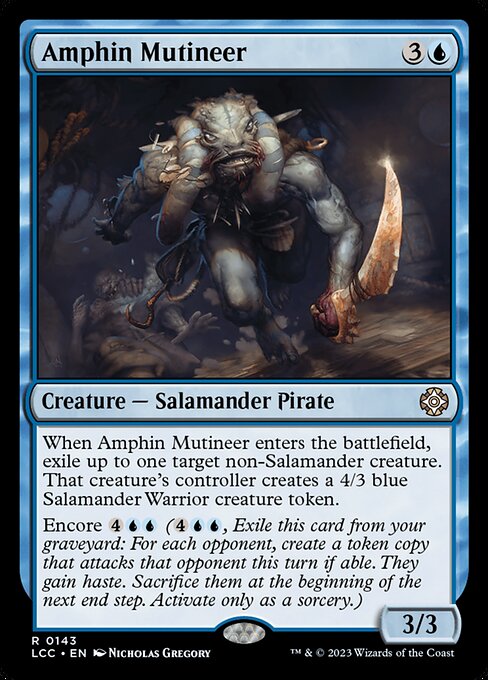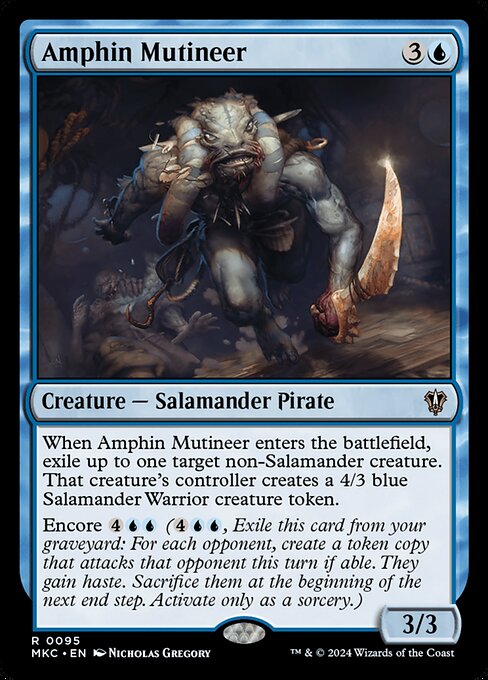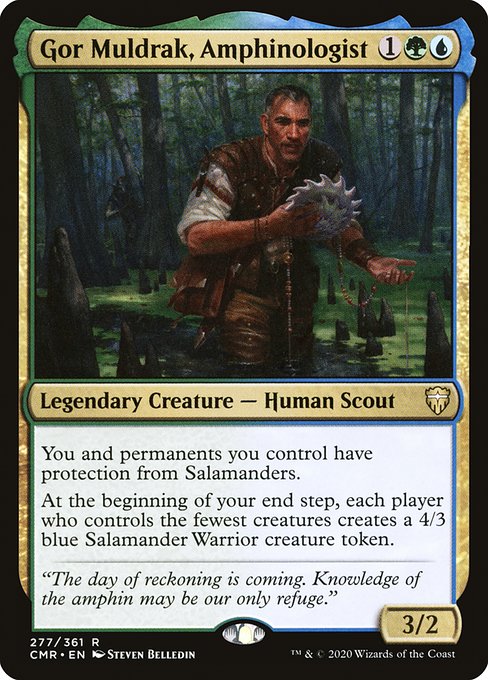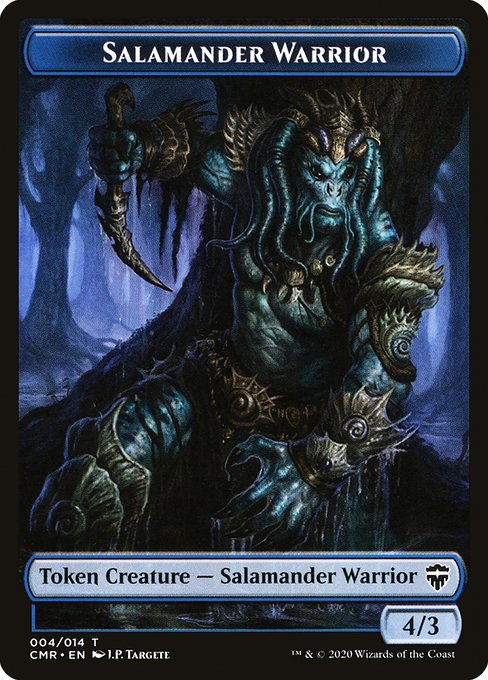Mutin amphin
Créature : salamandre et pirate
Quand le Mutin amphin arrive sur le champ de bataille, exilez jusqu'à une créature non-Salamandre ciblée. Le contrôleur de cette créature crée un jeton de créature 4/3 bleue Salamandre et Guerrier.
Encore (, exilez cette carte de votre cimetière : Pour chaque adversaire, créez une copie jeton qui attaque cet adversaire ce tour-ci si possible. Elle acquiert la célérité. Sacrifiez-la au début de la prochaine étape de fin. N'activez que lorsque vous pourriez lancer un rituel.)
Encore (, exilez cette carte de votre cimetière : Pour chaque adversaire, créez une copie jeton qui attaque cet adversaire ce tour-ci si possible. Elle acquiert la célérité. Sacrifiez-la au début de la prochaine étape de fin. N'activez que lorsque vous pourriez lancer un rituel.)
3/3
standard
future
historic
gladiator
pioneer
explorer
modern
legacy
pauper
vintage
penny
commander
brawl
alchemy
paupercommander
duel
oldschool
premodern
Rulings
If the target non-Salamander creature is an illegal target by the time Amphin Mutineer’s ability tries to resolve, the ability doesn’t resolve. No player creates a Salamander Warrior token.
Each token must attack the appropriate player if able.
The tokens copy only what’s on the original card. Effects that modified that creature when it was previously on the battlefield won’t be copied.
If one of the tokens somehow is under another player’s control as the delayed triggered ability resolves, you can’t sacrifice that token. It remains on the battlefield indefinitely, even if you regain control of it later.
If an effect stops a token from attacking a specific player, that token can attack any player or planeswalker, or not attack at all. If the effect stops the token from attacking a specific player unless a cost is paid, you don’t have to pay that cost unless you want to attack that player.
Exiling the card with encore is a cost to activate the ability. Once you announce that you’re activating it, no player may take actions until you’ve finished. They can’t try to remove the card from your graveyard to stop you from paying the cost.
If one of the tokens can’t attack for any reason (such as being tapped), then it doesn’t attack. If there’s a cost associated with having it attack, you aren’t forced to pay that cost, so it doesn’t have to attack in that case either.
Opponents who have left the game aren’t counted when determining how many tokens to create.
Each token must attack the appropriate player if able.
The tokens copy only what’s on the original card. Effects that modified that creature when it was previously on the battlefield won’t be copied.
If one of the tokens somehow is under another player’s control as the delayed triggered ability resolves, you can’t sacrifice that token. It remains on the battlefield indefinitely, even if you regain control of it later.
If an effect stops a token from attacking a specific player, that token can attack any player or planeswalker, or not attack at all. If the effect stops the token from attacking a specific player unless a cost is paid, you don’t have to pay that cost unless you want to attack that player.
Exiling the card with encore is a cost to activate the ability. Once you announce that you’re activating it, no player may take actions until you’ve finished. They can’t try to remove the card from your graveyard to stop you from paying the cost.
If one of the tokens can’t attack for any reason (such as being tapped), then it doesn’t attack. If there’s a cost associated with having it attack, you aren’t forced to pay that cost, so it doesn’t have to attack in that case either.
Opponents who have left the game aren’t counted when determining how many tokens to create.
Rulings
If the target non-Salamander creature is an illegal target by the time Amphin Mutineer’s ability tries to resolve, the ability doesn’t resolve. No player creates a Salamander Warrior token.
Each token must attack the appropriate player if able.
The tokens copy only what’s on the original card. Effects that modified that creature when it was previously on the battlefield won’t be copied.
If one of the tokens somehow is under another player’s control as the delayed triggered ability resolves, you can’t sacrifice that token. It remains on the battlefield indefinitely, even if you regain control of it later.
If an effect stops a token from attacking a specific player, that token can attack any player or planeswalker, or not attack at all. If the effect stops the token from attacking a specific player unless a cost is paid, you don’t have to pay that cost unless you want to attack that player.
Exiling the card with encore is a cost to activate the ability. Once you announce that you’re activating it, no player may take actions until you’ve finished. They can’t try to remove the card from your graveyard to stop you from paying the cost.
If one of the tokens can’t attack for any reason (such as being tapped), then it doesn’t attack. If there’s a cost associated with having it attack, you aren’t forced to pay that cost, so it doesn’t have to attack in that case either.
Opponents who have left the game aren’t counted when determining how many tokens to create.
Each token must attack the appropriate player if able.
The tokens copy only what’s on the original card. Effects that modified that creature when it was previously on the battlefield won’t be copied.
If one of the tokens somehow is under another player’s control as the delayed triggered ability resolves, you can’t sacrifice that token. It remains on the battlefield indefinitely, even if you regain control of it later.
If an effect stops a token from attacking a specific player, that token can attack any player or planeswalker, or not attack at all. If the effect stops the token from attacking a specific player unless a cost is paid, you don’t have to pay that cost unless you want to attack that player.
Exiling the card with encore is a cost to activate the ability. Once you announce that you’re activating it, no player may take actions until you’ve finished. They can’t try to remove the card from your graveyard to stop you from paying the cost.
If one of the tokens can’t attack for any reason (such as being tapped), then it doesn’t attack. If there’s a cost associated with having it attack, you aren’t forced to pay that cost, so it doesn’t have to attack in that case either.
Opponents who have left the game aren’t counted when determining how many tokens to create.
Votre collection ? vos decks ?
Envie de gérer votre collection et/ou créer des decks ?
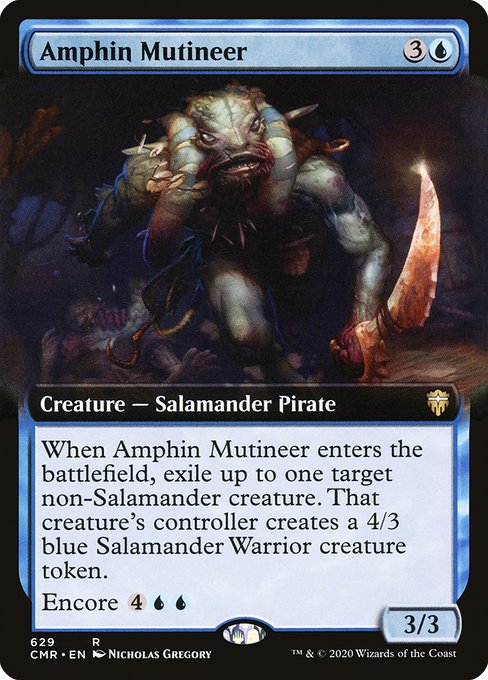

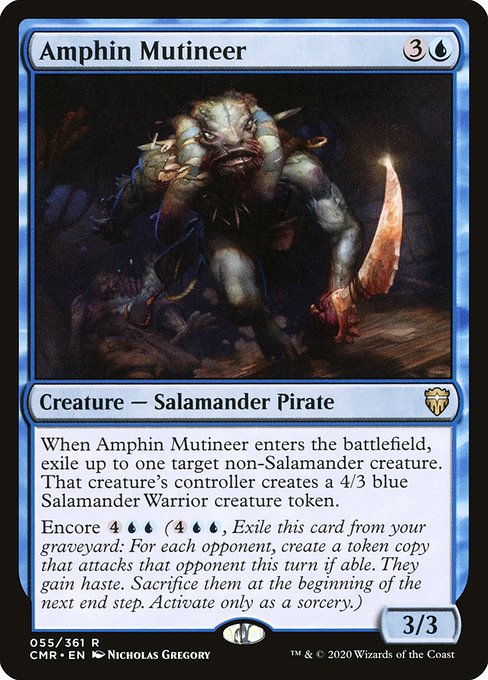
 0
0
 0.36€
0.36€
